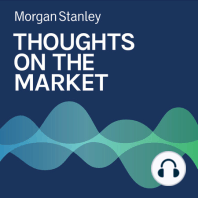4 min listen

Andrew Sheets: A More Promising Start to 2023
Andrew Sheets: A More Promising Start to 2023
ratings:
Length:
3 minutes
Released:
Dec 9, 2022
Format:
Podcast episode
Description
2022 was an unusual year for stocks and bonds, and while the future is hard to predict, the start of 2023 is shaping up to look quite different across several metrics.----- Transcript -----Welcome to Thoughts on the Market. I'm Andrew Sheets, Chief Cross-Asset Strategist for Morgan Stanley. Along with my colleagues, bringing you a variety of perspectives, I'll be talking about trends across the global investment landscape and how we put those ideas together. It's Friday, December 9th, at 5 p.m. in London. We try to be forward looking on this program, but let's take a moment to appreciate just how deeply unusual this year has been. Looking back over the last 150 years of U.S. equity and long term bond performance, 2022 is currently the only year where both stocks and long term bonds are down more than 10%. Several factors conspired to create such an unusual outcome. To start, valuations for both stocks and bonds were expensive. Growth was weak in China, but surprisingly resilient in the developed markets. That resilient growth helped drive the highest rates of U.S. inflation in 40 years. And that high inflation invited a strong response from central banks, with the Federal Reserve's target rate rising at its fastest pace, over a 12 month period, since the early 1980s. Looking ahead, the next 12 months look different across all of those factors. First, starting valuations look different. U.S. BBB-rated corporate bonds began the year yielding just 3.3%, they currently yield 5.4%. The S&P 500 stock index began the year at 22x forward earnings, that's now fallen to 17.5x. And U.S. Treasury yields relative to inflation, the so-called real yield, have gone from -1% to positive 1.1%. Second, the mix of growth changes on Morgan Stanley's forecasts. After 12 months where U.S. growth outperformed China, U.S. growth should now decelerate while growth in China picks up as the country exits zero-covid. We think growth in Europe is likely to see a recession, further emphasizing a shift from developed market to emerging market leadership in global growth. That weaker developed market growth should mean weaker developed market inflation. After hitting 40 year highs in 2022, our forecasts show U.S. headline inflation falling sharply next year, with U.S. CPI hitting a year on year rate of just 1.9% by the end of 2023. Weaker demand, high inventories, lower commodity prices, healing supply chains, a cooler housing market, and easier year on year comparisons, are all part of Morgan Stanley's lower inflation forecast. As growth slows and inflation moderates, central banks will likely gain more confidence that they have taken rates high enough. After the fastest rate hiking cycle in 40 years, the next 12 months could see both the Federal Reserve and the European Central Bank make their final rate hike in the first quarter of 2023. We think different dynamics should mean different results. After a run of underperformance, we think these changes will help emerging market assets now do better and outperform developed market assets. After an unusually bad year for bonds, we continue to think that these shifts will support high grade fixed income. While the future is always hard to predict, we think investors should prepare for some very different stories. Thanks for listening. If you enjoy Thoughts on the Market, please leave us a review on Apple Podcasts and share the podcast with a friend or colleague today.
Released:
Dec 9, 2022
Format:
Podcast episode
Titles in the series (100)
Mike Wilson: Weighing a Potential Fed Rate Cut by Thoughts on the Market